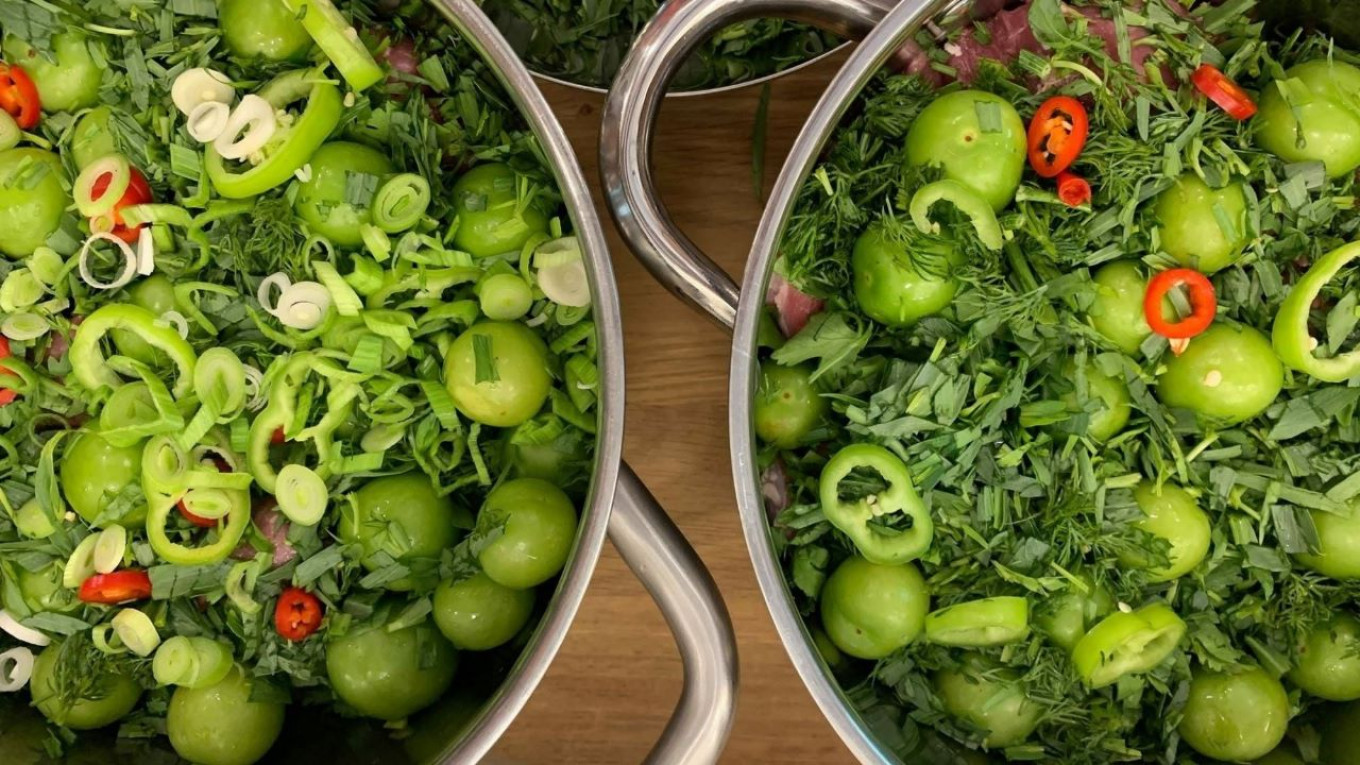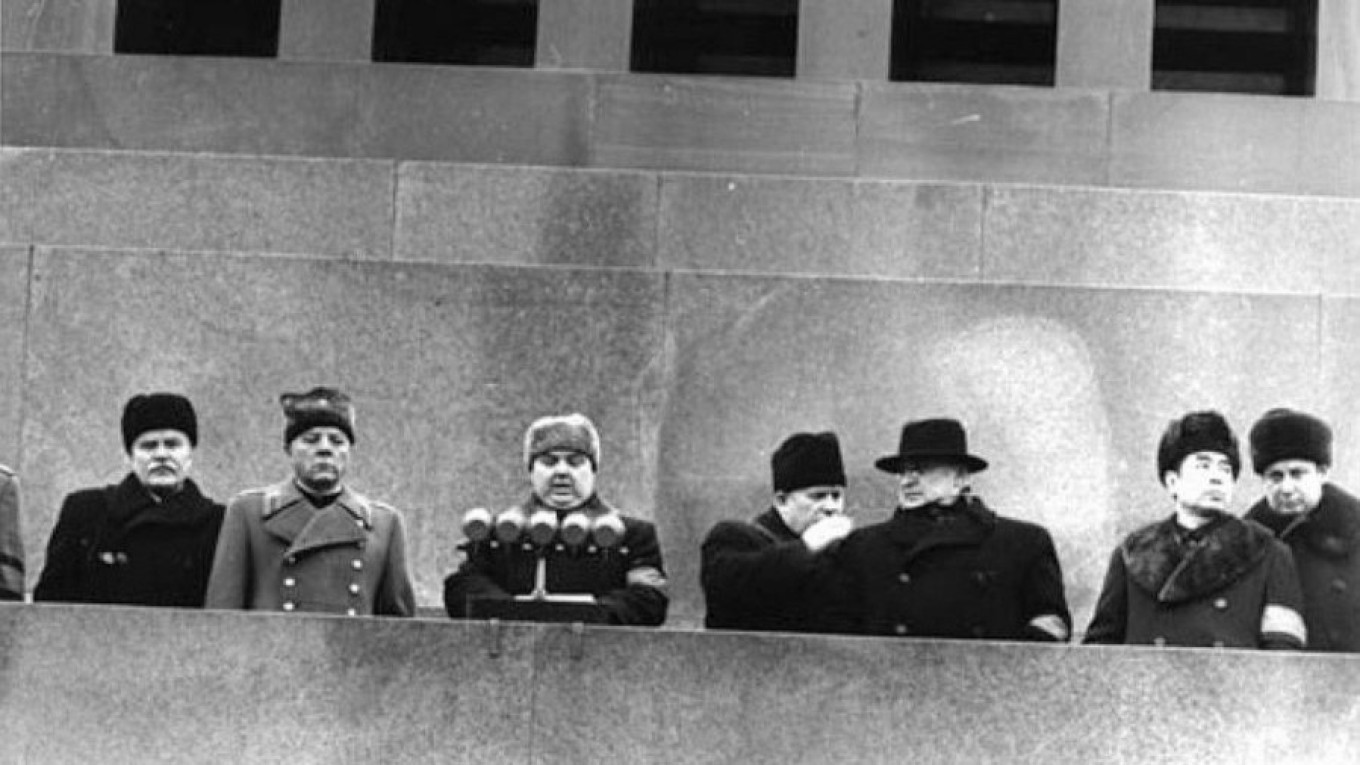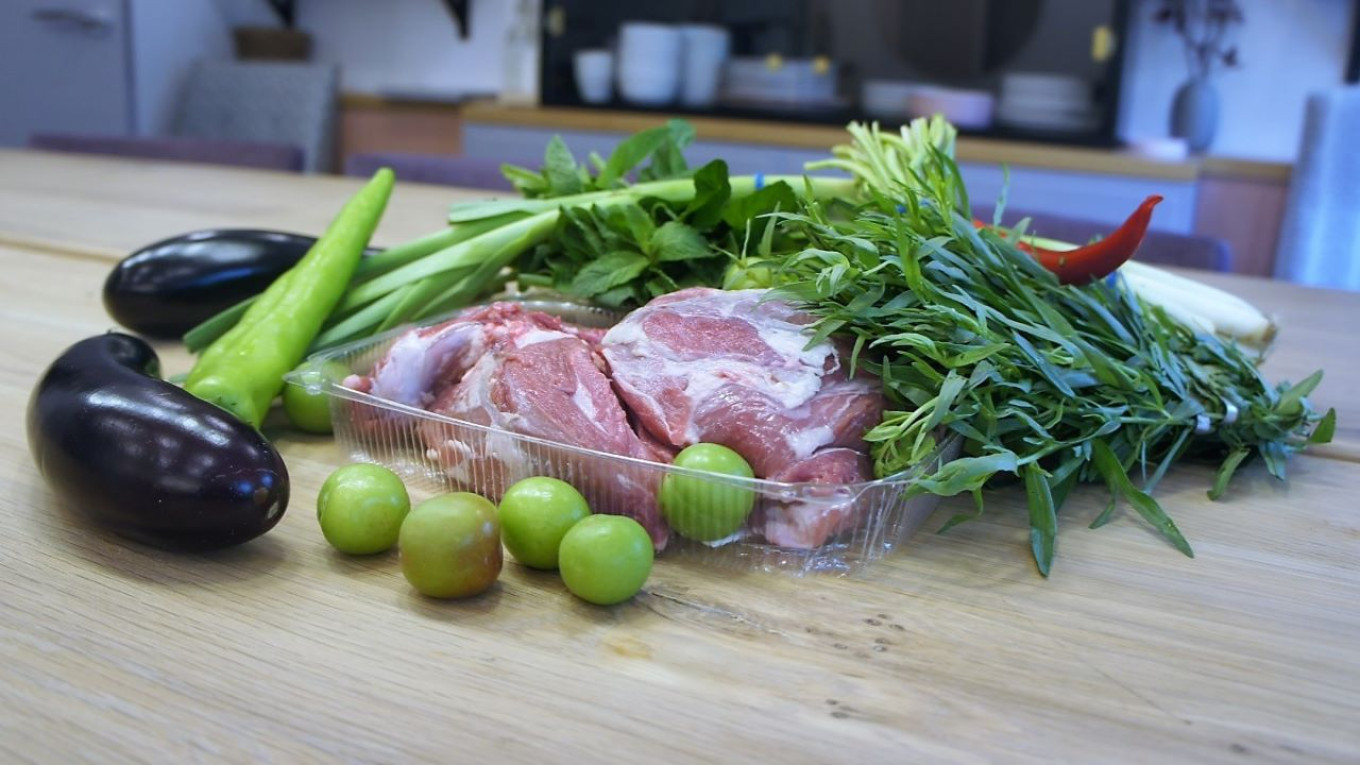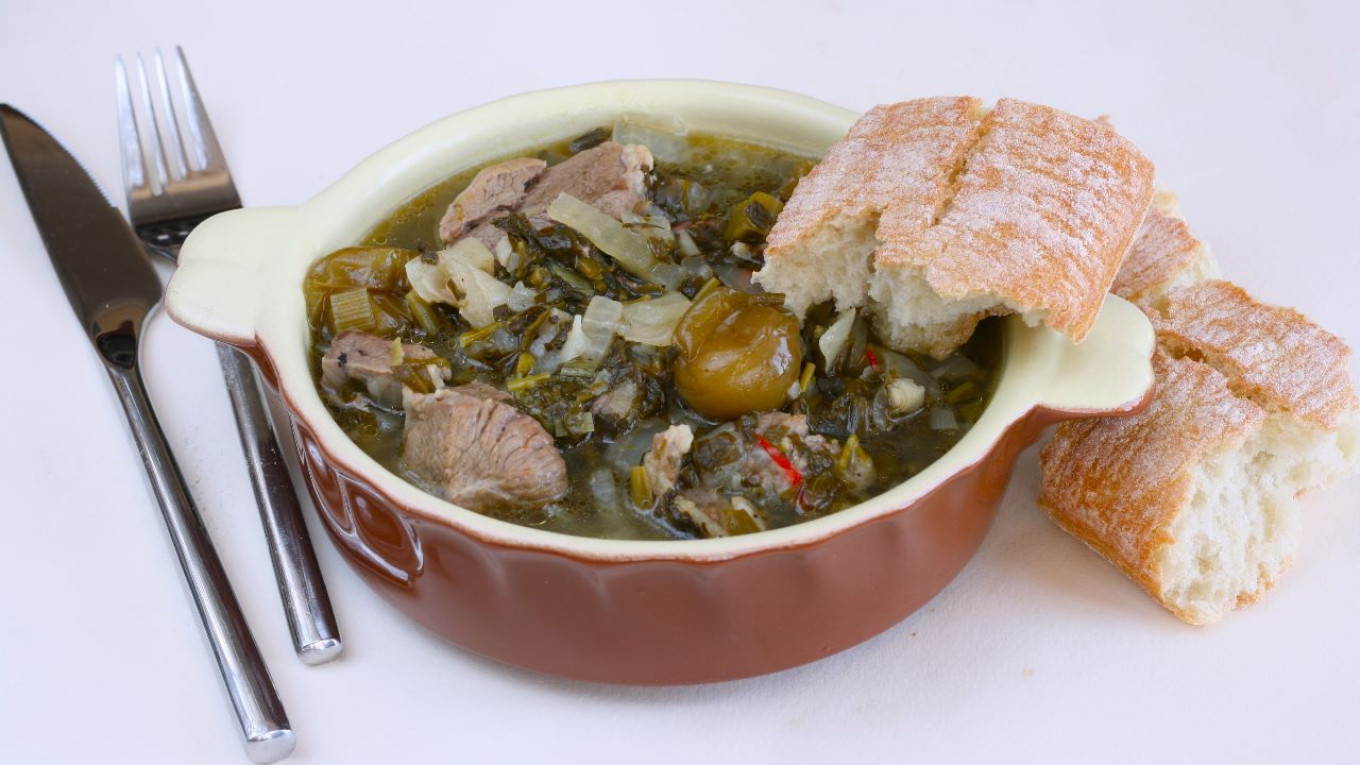Georgian food has been popular in Russia for a long time, but in the mid-1930s it was almost an official part of our cuisine. Shashlik, satsivi and kharcho were almost an obligatory attribute of Kremlin banquets, and they also appeared on menus in many restaurants.
In the Soviet years, Georgian cuisine was fared better than dishes from other Soviet republics. There’s a simple explanation: There were many natives of the Caucasus in the Soviet leadership, and they wanted to see dishes they were used to from their childhood on the Kremlin tables, especially on holidays. But even mere mortals quickly came to love shashlik and satsivi, spicy greens and suluguni cheese, sizzling kharcho soup and a variety of sauces —not to mention the Tsinandali and Kindzmarauli wines. The Moscow restaurant Aragvi, which was the most famous place to enjoy the bright and flavorful Georgian cuisine in the capital, has been one of the most popular restaurants in the country for many years.
What did Georgia share with the other Soviet republics? Wine, of course! The republic was the national wine cellar. Georgian winemakers supplied dry, table, semisweet, fortified, dessert and sparkling wines, as well as vintage and ordinary cognacs. Borjomi and Nabeglavi mineral waters were also very popular. And New Year’s wasn’t New Year’s without Abkhazian tangerines!
Needless to say, these delicacies acquired a touch of festivity, so different from the everyday food of the majority of the population. All those spicy sauces and vivid flavors were like a burst of celebration. An important element was a fruit called alycha — the cherry plum.
This fruit wasn’t discovered during the Soviet period. It was known and used in cooking in Russian cuisine when Russia began to develop the southern regions of the Black Sea, Caucasus and Transcaucasia. It was there on the Abkhazian seashore that our ancestors encountered huge bushes of this wild relative of cultivated plums.

Wild cherry plums don’t taste as good as cultivated plums, but where they grow in abundance, they are also used in cooking. They have also been used for making sauces for ages. Georgian tkemali made of green cherry plums is an indispensable part of many dishes, including those served at Stalin's banquets and the dinners his colleagues enjoyed at the Aragvi. Commissar of Internal Affairs Lavrenty Beria even had an office at the Aragvi, where he not only ate lunch but could sit on his balcony and watch the main hall where officials, artists, writers and diplomats enjoyed their meals and conversation.

Above: In 2000, the Moscow restaurant Aragvi closed and only reopened after 16 years. Beria's office was carefully restored. He’d watch his colleagues having lunch from this balcony.
This simple rhyme was very popular in Moscow in 1953, when the all-powerful secret police chief and member of the Presidium of the CPSU Central Committee was arrested on the order of Nikita Khrushchev and later sentenced to death.
Lavrenty Beria fell from favor, his guilt was absolute,
Even Comrade Georgy Malenkov gave him the boot.
New times were coming, and new faces were appearing in the country’s leadership. There is a story that Georgy Malenkov's career rise began with an odd incident. In 1926, he was working as an ordinary member of the Party Central Committee. One day, the secretary of the party cell went on leave. When the meticulous Malenkov replaced him, he looked through the party cards on file for all the members and noticed an irregularity on Stalin's record card. Either out of stupidity or extreme courage, he telephoned Stalin personally on the special phone system.
"Comrade Stalin, I’d like to make an appointment to discuss a matter that concerns you.”
“You can come now.”
Malenkov entered Stalin’s office and said, “Comrade Stalin, according to rules, you should be expelled from the party since you haven’t paid your dues since 1922.”
Stalin was surprised, but replied, “You’re absolutely right.” And he ordered that his party dues be brought up to date.
Within a year Malenkov jumped up several rungs in the hierarchy to become Secretary of the Central Committee and then a member of the Politburo. After Stalin's death and Beria's arrest and execution, he headed the country's government.
At about the same time some new satirical political verses appeared and made the rounds. For some reason, Muscow street poets thought of the cherry plum – alycha – when all this happened.
There is a plum called alych-ah!
It’s not for Lavrenty Palych-ah!
But for Kliment Yefremych-ah!
And Vyacheslav Mikhalych-ah!
A few names in this poem may not say anything to the younger generations today. But in 1953, Kliment Voroshilov and Vyacheslav Molotov came out as the winners in the Kremlin battle for survival. Comrade Beria, as we know, did not come out well at all.
Below: Here they are on the Mausoleum (from left to right): Vyacheslav Molotov, Kliment Voroshilov, Georgy Malenkov. A little to the right in the hat is Lavrenty Beria.

These old men of the Kremlin are long gone. And we hope that this era has fallen into oblivion forever. But we don't regret the spicy Georgian dishes that have become a part of our cuisine.
Here's one called chakapuli, a spicy stew made with lamb and cherry plums. This is the right time to prepare it, since cherry plums have already appeared in the markets.

Chakapuli: Georgian Cherry Plum and Lamb Stew
Ingredients
- 800 g (1 ¾ lb) lamb (thigh and ribs)
- 750 ml (3/4 l) dry white wine
- 400 g (scant lb) green cherry plums
- 2 medium bunches tarragon
- 1 medium bunch dill
- 1 medium bunch cilantro
- 1 red hot pepper
- 1 green hot pepper
- 2 onions
- 2 young garlic cloves with scapes
- salt to taste
Instructions
Note: Use a heavy bottom pot.
- Cut the lamb into small pieces.
- Dice the onion, chop the garlic and the garlic scapes together.
- Pull off the leaves from stalks of tarragon.
- Coarsely chop all the herbs and flavorings: tarragon, dill, cilantro and pepper.
- Put meat, cherry plums, onions, garlic, peppers and about 3/4 of chopped greens in layers in a heavy bottom pot.
- Salt and pepper, add wine and bring to a boil over medium heat.
- After it comes to a boil, turn down the heat and cook at a gentle simmer until the meat is tender, about an hour to an hour and 40 minutes.
- 10 minutes before it is ready, add the rest of the herbs. Before serving let the chakapuli rest for 15 minutes.
- Serve with Georgian bread —shotis puri — or fresh ciabatta, which is probably easier to find in your local shop.

A Message from The Moscow Times:
Dear readers,
We are facing unprecedented challenges. Russia's Prosecutor General's Office has designated The Moscow Times as an "undesirable" organization, criminalizing our work and putting our staff at risk of prosecution. This follows our earlier unjust labeling as a "foreign agent."
These actions are direct attempts to silence independent journalism in Russia. The authorities claim our work "discredits the decisions of the Russian leadership." We see things differently: we strive to provide accurate, unbiased reporting on Russia.
We, the journalists of The Moscow Times, refuse to be silenced. But to continue our work, we need your help.
Your support, no matter how small, makes a world of difference. If you can, please support us monthly starting from just $2. It's quick to set up, and every contribution makes a significant impact.
By supporting The Moscow Times, you're defending open, independent journalism in the face of repression. Thank you for standing with us.
Remind me later.







